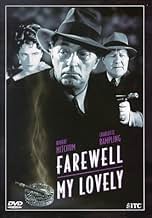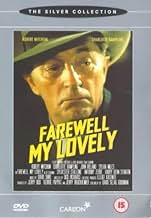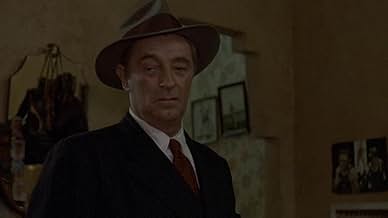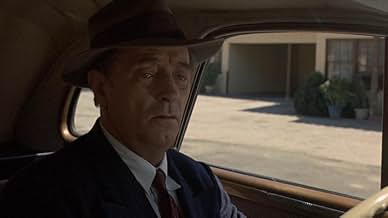ÉVALUATION IMDb
7,0/10
10 k
MA NOTE
Le détective privé de Los Angeles, Philip Marlowe, est embauché par le détenu en liberté conditionnelle Moose Malloy pour retrouver sa petite amie Velma, ancienne danseuse de boîte de nuit.Le détective privé de Los Angeles, Philip Marlowe, est embauché par le détenu en liberté conditionnelle Moose Malloy pour retrouver sa petite amie Velma, ancienne danseuse de boîte de nuit.Le détective privé de Los Angeles, Philip Marlowe, est embauché par le détenu en liberté conditionnelle Moose Malloy pour retrouver sa petite amie Velma, ancienne danseuse de boîte de nuit.
- Director
- Writers
- Stars
- Nommé pour 1 oscar
- 1 victoire et 3 nominations au total
Jimmy Archer
- Georgie
- (as Jimmie Archer)
Avis en vedette
In the wake of 'The Long Goodbye' and, especially, 'Chinatown', there was a profusion in the mid- to late-70s of recreated films noirs of the Chandlerian bent, many featuring aging stars. 'Farewell My Lovely' is one of the best - while it does not reek of the depravity of Dmytryk's 1944 version, starring Dick Powell, it is broader in scope, and truer to a kind of lived-in realism, as opposed to hard-boiled iconography. It's nice to see 1940s L.A. close to what it might have looked like, and not the vague dreamworlds presented by classic noir. it would be a mistake to assume that this is a progressive, or revisionist movie - while it scores well in its treatment of race, the fundamental misogyny of Chandler's source novel and Dmytryk's film lingers. Indeed, it is less palatable, in that 40s Hollywood made its villainesses glamorous, charismatic and desirable; Charlotte Rampling seems barely to exist on screen, a mere assemblage of corruption and cold amorality.
The hard-boiled detective fictions of Dashiell Hammett and Raymond Chandler were created in conscious opposition to the reactionary puzzles of the English Golden Age (eg Agatha Christie), which were exercises in asserting order and social control. Chandler tried to express a bleaker reality, one where arbitrary violence and corruption is not so easily contained, where smaller crimes may be solved, but society itself is rotten, diseased, irredeemable. Chandler pits his hero Philip Marlowe against this malaise, tough, solitary, misanthropic, frequently compared to medieval knights, as hopelessly out of his time as Don Quixote.
Chandler's novels are completely filtered through the prejudiced narration of Marlowe, so instead of realism we get a barely controlled expressionism, riddled with ideology. Marlowe is unable to trust anyone, and defines himself against everyone else, the Other, especially women and blacks. This is a subtext in the novel, but RIchards foregrounds it in the early scenes of this film. When Marlowe enters a black neighbourhood investigating Velma, he is very uncomfortable in an alien environment. Although, as a detective, he has the freedom to navigate the city, to access both poor black neighbourhoods and obscenely wealthy white mansions in a way neither one of these nor the other can, he is still constrained by ideology, the ideology of his times - he is not as apart from the corruption as he thinks. And so we frequently see him indoors, even imprisoned, by cops and criminals alike - like a conservative, everything is connected for Marlowe, except everything stinks.
This making mental states physical is important for a narrative seen through its hero's head. It puts us on our guard, distances us from Marlowe in a way Chandler never lets us, allows us to be more critical. Another device is the bizarre use of narrative voiceover. This seems conventional enough, Marlowe telling us the story, controlling, interpreting, often verbatim from the book. But his voiceover is broken - he starts addressing us, then, within that, he tells Nulty a story; so that the viewer is at two removes from a story that we only have it's teller's word for its veracity. In its modest way, the film DOES have revisionist aspirations.
Unlike Altman's film, 'Farewell' is purely enjoyable on the level of a murder-mystery thriller - the plot is satisfyingly, Chandlerianly (sic?) opaque; there are sufficient interesting supporting characters; the violence seems quaintly 1940s; the music is exciting. The film, therefore, would be pleasant, but harmless, except for one crucial element: Robert Mitchum, America's greatest actor. His aging Marlowe might be more appropriate to 'The Long Goodbye', but this is an astonishing portrait of middle- giving on to old-age, a study of a man struggling with cynicism, trying to maintain order (wisecracks; narration; frequent references to baseball, a game with rules) and humanity (the kid) in a world that only offers diabolic inversions of each.
Even more resonantly, the film is a film about film noir, about acting, about Robert Mitchum, soon to become famous in the period represented, soon the embodiment of the doomed noir hero. The Chandlerian dialogue that works wonderfully on the page can seem corny and stilted when spoken, but Mitchum pulls it off with melancholy beauty. He is the only screen Marlowe that seems like an actual human being who has lived - not even Bogie quite managed that.
The hard-boiled detective fictions of Dashiell Hammett and Raymond Chandler were created in conscious opposition to the reactionary puzzles of the English Golden Age (eg Agatha Christie), which were exercises in asserting order and social control. Chandler tried to express a bleaker reality, one where arbitrary violence and corruption is not so easily contained, where smaller crimes may be solved, but society itself is rotten, diseased, irredeemable. Chandler pits his hero Philip Marlowe against this malaise, tough, solitary, misanthropic, frequently compared to medieval knights, as hopelessly out of his time as Don Quixote.
Chandler's novels are completely filtered through the prejudiced narration of Marlowe, so instead of realism we get a barely controlled expressionism, riddled with ideology. Marlowe is unable to trust anyone, and defines himself against everyone else, the Other, especially women and blacks. This is a subtext in the novel, but RIchards foregrounds it in the early scenes of this film. When Marlowe enters a black neighbourhood investigating Velma, he is very uncomfortable in an alien environment. Although, as a detective, he has the freedom to navigate the city, to access both poor black neighbourhoods and obscenely wealthy white mansions in a way neither one of these nor the other can, he is still constrained by ideology, the ideology of his times - he is not as apart from the corruption as he thinks. And so we frequently see him indoors, even imprisoned, by cops and criminals alike - like a conservative, everything is connected for Marlowe, except everything stinks.
This making mental states physical is important for a narrative seen through its hero's head. It puts us on our guard, distances us from Marlowe in a way Chandler never lets us, allows us to be more critical. Another device is the bizarre use of narrative voiceover. This seems conventional enough, Marlowe telling us the story, controlling, interpreting, often verbatim from the book. But his voiceover is broken - he starts addressing us, then, within that, he tells Nulty a story; so that the viewer is at two removes from a story that we only have it's teller's word for its veracity. In its modest way, the film DOES have revisionist aspirations.
Unlike Altman's film, 'Farewell' is purely enjoyable on the level of a murder-mystery thriller - the plot is satisfyingly, Chandlerianly (sic?) opaque; there are sufficient interesting supporting characters; the violence seems quaintly 1940s; the music is exciting. The film, therefore, would be pleasant, but harmless, except for one crucial element: Robert Mitchum, America's greatest actor. His aging Marlowe might be more appropriate to 'The Long Goodbye', but this is an astonishing portrait of middle- giving on to old-age, a study of a man struggling with cynicism, trying to maintain order (wisecracks; narration; frequent references to baseball, a game with rules) and humanity (the kid) in a world that only offers diabolic inversions of each.
Even more resonantly, the film is a film about film noir, about acting, about Robert Mitchum, soon to become famous in the period represented, soon the embodiment of the doomed noir hero. The Chandlerian dialogue that works wonderfully on the page can seem corny and stilted when spoken, but Mitchum pulls it off with melancholy beauty. He is the only screen Marlowe that seems like an actual human being who has lived - not even Bogie quite managed that.
The choice of Mitchum for the lead role really did work. The novel suggest a tired Marlowe, who has had enough of being "detective to the stars". He wants to get out of his seedy little life, and change things, but instead, he gets wrapped up in another case. Mitchum's hang dog expression and tired wise guy act sums up the depression of the fallen hero. This is not the smooth talking Bogart, not the finely clipped and smooth Powell, but a harder, more experienced Marlowe, a man more aware of his own downfall. As he says to knulty, what he need is a nights sleep, what he needs is another drink. After watching this truly excellent recreation of late forties LA, I'm not sure that I couldn't agree with him.
Ah yes, and Charlotte Rampling and the sometime Thelma really was "cuter than lace pants"
Ah yes, and Charlotte Rampling and the sometime Thelma really was "cuter than lace pants"
This re-make of Raymond Chandler's work has the edge on the 1944 film. Robert Mitchum's face fits the film perfectly. His ageing hard boiled-looking features look like a relief map of the Rocky Mountains! In this movie Mitchum was as good he has ever been. He got better as he got older. What I also liked was the haunting but soulful musical score, at the beginning and at the end.
In the closing scene an atmosphere of rising crisis that seems to hang in the air; created by the soulful musical score. Marlow with the case all wrapped up and himself at a loose end; in the amusement centre playing the machines, picks up a discarded newspaper with "Tokyo" in bold print as the front page headline. Was this the late hours of the 6th of December in Los Angeles? A sailor and his girl, and a soldier in the background makes it seem so. Both the sailor and the soldier, and the whole of America blissfully unaware, that a Japanese armada has shaped a easterly course
across the North Pacific. That scene coupled with the soulful musical score is like a forlorn-sounding and doom-laden overture to what is about to happen with surprising and devastating suddenness on the following but quiet Sunday morning in Hawaii. It is not surprising that one of the songs is titled, "Sunday".
In the closing scene an atmosphere of rising crisis that seems to hang in the air; created by the soulful musical score. Marlow with the case all wrapped up and himself at a loose end; in the amusement centre playing the machines, picks up a discarded newspaper with "Tokyo" in bold print as the front page headline. Was this the late hours of the 6th of December in Los Angeles? A sailor and his girl, and a soldier in the background makes it seem so. Both the sailor and the soldier, and the whole of America blissfully unaware, that a Japanese armada has shaped a easterly course
across the North Pacific. That scene coupled with the soulful musical score is like a forlorn-sounding and doom-laden overture to what is about to happen with surprising and devastating suddenness on the following but quiet Sunday morning in Hawaii. It is not surprising that one of the songs is titled, "Sunday".
Stylish remake of the much-filmed Chandler classic. Was Mitchum too old for the rolethat was the rap at the time. In hindsight, I don't think so, especially when he has that persuasive moment about aging near film's end. He certainly looks like he's climbed too many stairs and closed too many bars, but then that creates an unusual amount of pathos that deepens the role. Still and all, the passionate clinches with a sleek young Charlotte Rampling are borderline at best.
This is one of the few successful neo-noirs in my little book. Director Dick Richards and crew manage a funky look just right for the hard-boiled atmosphere of 40's detective fiction. Marlowe (Mitchum) drifts from one seedy venue to the next in his search for the mysterious Velma. But true to Chandler's slice-of-life LA, there's also a glimpse of the high- and-mighty in a Beverly Hills palace worthy of royalty. In fact, Marlowe resembles something of a pilgrim loner navigating greater LA in search of an elusive truth even after he's forgotten why.
Mitchum, of course, lowkeys all the way, hardly changing expression whether being roughed up by Moose Malloy or nuzzling up to Helen Grayle (Rampling). It has to be one of the more downbeat performances in private eye annals. But my Oscar goes to Sylvia Miles as the ultimate blowzy drunk (Florian). Her house is a mess, her hair is a mess, and her robe never quite fits in revealing ways Marlowe refuses to pick up on. Still and all, a fling with her looks more promising than an interlude with that plastic mannequin Marlowe does cozy up with. At the same time, Jack O'Halloran as the Moose comes across as the kind of pitiable dumb ox who would sacrifice everything for a faithless woman. In fact, the movie boils down oddly to something of a Samson and Delilah update.
But not everything is upside. The dialogue occasionally gets a little too cute, while the DiMaggio running thread seems forced at times. Nonetheless, it's a worthy version of the popular novel, and I'm just sorry that director Dick Richards hasn't been more active in the production end of the business. Judging from this film and the under-rated Culpepper Cattle Company, he certainly has the talent. And when an expressionless Marlowe comes to part with his money at movie's end, we finally glimpse that remote inner terrain and the heart of Chandler's heartless world.
This is one of the few successful neo-noirs in my little book. Director Dick Richards and crew manage a funky look just right for the hard-boiled atmosphere of 40's detective fiction. Marlowe (Mitchum) drifts from one seedy venue to the next in his search for the mysterious Velma. But true to Chandler's slice-of-life LA, there's also a glimpse of the high- and-mighty in a Beverly Hills palace worthy of royalty. In fact, Marlowe resembles something of a pilgrim loner navigating greater LA in search of an elusive truth even after he's forgotten why.
Mitchum, of course, lowkeys all the way, hardly changing expression whether being roughed up by Moose Malloy or nuzzling up to Helen Grayle (Rampling). It has to be one of the more downbeat performances in private eye annals. But my Oscar goes to Sylvia Miles as the ultimate blowzy drunk (Florian). Her house is a mess, her hair is a mess, and her robe never quite fits in revealing ways Marlowe refuses to pick up on. Still and all, a fling with her looks more promising than an interlude with that plastic mannequin Marlowe does cozy up with. At the same time, Jack O'Halloran as the Moose comes across as the kind of pitiable dumb ox who would sacrifice everything for a faithless woman. In fact, the movie boils down oddly to something of a Samson and Delilah update.
But not everything is upside. The dialogue occasionally gets a little too cute, while the DiMaggio running thread seems forced at times. Nonetheless, it's a worthy version of the popular novel, and I'm just sorry that director Dick Richards hasn't been more active in the production end of the business. Judging from this film and the under-rated Culpepper Cattle Company, he certainly has the talent. And when an expressionless Marlowe comes to part with his money at movie's end, we finally glimpse that remote inner terrain and the heart of Chandler's heartless world.
When Dick Powell did his version of this Raymond Chandler classic Philip Marlowe story, he and RKO were laboring under the handicap of the motion picture code. Certain things like prostitution and homosexuality were simply not talked about in those times. Still with the changes that had to be made in the plot a really great version was done and it changed the career of Dick Powell forever.
Now back in those days, Robert Mitchum was getting started and would soon be doing many a noir film for RKO himself. In getting him for this version under the original title of Farewell My Lovely the producers certainly got themselves someone with whom the Philip Marlowe character fit like a glove.
Even with color, this version is remarkably evocative of the Forties style noir film. Charlotte Rampling steps nicely into the well trod path of people like Lauren Bacall and Lizabeth Scott.
For those who don't know the barebones of the story, Philip Marlowe is hired to find Velma Valento by her old gangster boy friend, a giant of a man named Moose Malloy who just finished doing a stretch in prison. Later on a man named Lindsay Marriott hires him to as a bodyguard and he's killed. The two cases are related and the how and why is what moves the plot.
John Ireland another forties veteran of many a noir film plays police lieutenant Nulty and my favorite in the film is Sylvia Miles who is the luckless dipsomaniacal Mrs. Florian.
I do marvel when I see this film at how well the spirit of the forties was captured in this film. Turn off the color on your set and its just like watching a great noir flick from that decade.
Now back in those days, Robert Mitchum was getting started and would soon be doing many a noir film for RKO himself. In getting him for this version under the original title of Farewell My Lovely the producers certainly got themselves someone with whom the Philip Marlowe character fit like a glove.
Even with color, this version is remarkably evocative of the Forties style noir film. Charlotte Rampling steps nicely into the well trod path of people like Lauren Bacall and Lizabeth Scott.
For those who don't know the barebones of the story, Philip Marlowe is hired to find Velma Valento by her old gangster boy friend, a giant of a man named Moose Malloy who just finished doing a stretch in prison. Later on a man named Lindsay Marriott hires him to as a bodyguard and he's killed. The two cases are related and the how and why is what moves the plot.
John Ireland another forties veteran of many a noir film plays police lieutenant Nulty and my favorite in the film is Sylvia Miles who is the luckless dipsomaniacal Mrs. Florian.
I do marvel when I see this film at how well the spirit of the forties was captured in this film. Turn off the color on your set and its just like watching a great noir flick from that decade.
Le saviez-vous
- AnecdotesIn the novel, Philip Marlowe was in his 30s. Robert Mitchum, who plays him in this film, was 57.
- GaffesWhen Marlowe (Robert Mitchum) drives up to Mrs. Grayle's home (Charlotte Rampling), the front entrance is obviously double doors but when the butler is shown opening it from the inside, it is clearly a single door.
- Citations
Philip Marlowe: [voiceover] The house itself wasn't much. It was smaller than Buckingham Palace and probably had fewer windows than the Chrysler building.
- ConnexionsFeatured in Proini peripolos (1987)
- Bandes originalesI've Heard That Song Before
Words and Music by Jule Styne and Sammy Cahn
Sung in the dance hall at the opening.
Meilleurs choix
Connectez-vous pour évaluer et surveiller les recommandations personnalisées
- How long is Farewell, My Lovely?Propulsé par Alexa
Détails
Box-office
- Budget
- 2 500 000 $ US (estimation)
Contribuer à cette page
Suggérer une modification ou ajouter du contenu manquant


































